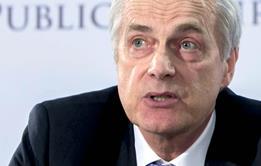In his report into Mid Staffordshire and his first in-depth interview, Robert Francis demands more honesty and transparency from the NHS. But “the truth” is often in the eye of the beholder in the health service.
If the thrust of Robert Francis QC’s report into the care failings at Stafford hospital could be summed up in one word it would be “honesty”.
‘Francis hopes his report’s prioritisation of patient safety will shift the service’s centre of gravity’
Honesty with patients who have been harmed, honesty among healthcare professionals who become aware standards are slipping and honesty among regulators and system leaders that a new approach is needed to minimise future care scandals.
Now Mr Francis − in the first in-depth interview after the report’s publication − calls for an even more demanding level of honesty from the service.
The inquiry chair once more sets out his case for fundamental care standards and the need for criminal sanctions to give them bite. Fail to do this he says, and confidence in the NHS will “evaporate”.
Counterproductive spirit
But Mr Francis goes further. He calls on the NHS to be “honest about what it can and it can’t do” while maintaining “safe and effective care” in a time of constrained resources. The NHS “shouldn’t pretend” it can deliver a “fundamental” level of care if, for example, the required staffing levels are not available.
He believes the Blitz spirit that often takes hold of the NHS when the going gets tough can be counterproductive.
‘The inquiry chair says his report has sparked “a seminal moment in the NHS”’
“We have had a culture in the NHS for too long that it doesn’t matter what is thrown at us we will deliver,” he told HSJ, “[but] actually we have to have a conversation about what you can deliver in a rather more honest way than what has happened before.”
More from our exclusive interview with Robert Francis
Instead, he wants those leading and working in overstretched services to feel emboldened to enough to say, “I can’t provide the service.” His proposed duty of candour would prevent colleagues and employers from suppressing these claims.
Mr Francis hopes his report’s prioritisation of patient safety will shift the service’s centre of gravity away from a deceptive muddling through to a clear-sighted focus on delivering effective care.
The inquiry chair says his report has sparked “a seminal moment in the NHS” which many believe “has to be grasped”.
Public doubt
He praises NHS medical director Sir Bruce Keogh for his rapid action when concern was raised over the safety of paediatric cardiac services at Leeds General Infirmary. This was “a sea change from what has happened to date”
However, the controversy sparked by that move highlights the distance the NHS is from having an “honest” debate about service quality and resource allocation. Sir Bruce’s decision unleashed a torrent of claim and counter-claim, accusations of dirty tricks and a focus on winners and losers.
‘In the aftermath of the Francis report it seemed as if “sorry” was the hardest word in the NHS lexicon’
There was also an undercurrent of criticism that the decision had created doubt in the mind of the public − something which is an inevitable consequence of an honest debate about healthcare quality.
An even starker illustration is provided by the very town which was most affected by the failures at Mid Staffordshire Foundation Trust.
Stafford is a community divided. The campaign group Cure the NHS was praised by Mr Francis for their determination to get justice for relatives that suffered. Yet group organiser Julie Bailey is a regular target of verbal, physical and online intimidation from those in the area who believe her campaigning will lead to the closure or downgrading of the hospital.
“Honesty” or “the truth” is too often in the eye of the beholder in the NHS. Even “clinical evidence” − the supposed end to all arguments − is often the subject of fierce debate. Resourcing is an even trickier subject − it is always possible to argue for more or to suggest someone else has too much.
In the aftermath of the Francis report it seemed as if “sorry” was the hardest word in the NHS lexicon. That is nearly right; the most challenging phrase begins, “Sorry, but…”
Exclusive: Francis presses government on criminal sanctions

The absence of an ability to prosecute individual NHS staff in cases of serious patient neglect would cause “public confidence” in the service to “evaporate”, Robert Francis QC has told HSJ.
- 1
- 2
- 3
- 4
- 5
 Currently
reading
Currently
reading
Leader: Francis demands more honesty from the NHS





































10 Readers' comments